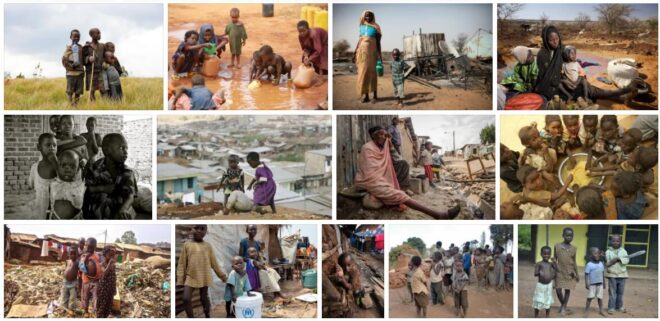Causes of Poverty in Africa
When we talk about Africa , it is very common to have a stereotyped conception that the countries of that continent are poor or miserable. In order to understand the real causes and consequences of African poverty, it is necessary to reflect on the meaning of the term poverty.
Poverty can be defined as the state of every individual whose level of income or consumption is below essential to meet basic human needs.
According to Countryaah, African countries are among those with the lowest nominal GDP per capita in the world, showing the low economic rates of the countries of the continent. When, in addition to economic indices, data on quality of life such as those considered by the HDI (Human Development Index) are taken into account, African countries remain among those with the lowest global indices.
Most of the countries classified as having a low HDI belong to the African continent. These data show that poverty in Africa is not a one-off phenomenon, but that it occurs in a large part of the continent, mainly in the sub-Saharan region, where the countries that suffered most from the colonial exploitation process are located.
The high rates of poverty in a large part of the population that inhabits Africa are not the result of an isolated explanation. The factors that contribute to the establishment of a state of conjunctural poverty are multiple and are related to the internal structures of African countries and to the various external agents that, in some way, influence social, political and economic structures in that continent.
Poor land management
African countries have, in general, a large concentration of land, a legacy of the Colonial Period, in which more fertile areas and with better agricultural productivity were distributed among European colonists. With the end of the Colonial Period, there was no redistribution of these lands, which remained in the possession of the elite. This structure made most of the rural African population have access to smaller agricultural areas, with lower productivity and poorer soils, leaving such a population at a disadvantage.
To get an idea of how this concentration of incomes occurs, in South Africa, for example, about 82% of all agricultural areas are concentrated in the hands of descendants of Europeans. This system means that Africans, in fact, do not have ownership of large areas of agriculture. Among the alternatives that remain for the rural population of these countries are to work as employees on land belonging to other people or to use less productive land, even without title.
Misuse of financial resources
Another impact factor on Africa’s poverty is the misuse of aid financial resources. Annually, a very significant amount is sent to the continent by bodies and organizations that collaborate in the fight against poverty. Although the donations amount to more than hundreds of billions of dollars each year, these donations have little significant impact in the long run.
One of the main reasons for the misuse of these resources involves political systems in force on the African continent. Many countries face undemocratic government regimes, with little transparency in the use of their resources, which leaves room for donated values to not necessarily be directed to their initial uses. Corruption also has a negative impact on moving aid to areas that really need it. The diversion of financial resources, in addition to perpetuating the situation of poverty in African countries, creates a climate of distrust among donors.
Human Resources
With low levels of education, especially in rural regions, African countries find it difficult to train human resources to strengthen sources of income and promote changes in the situation of poverty.
Without access to education, younger populations are unable to rise socially and economically in relation to previous generations, which generates a cycle of poverty for generations.
One of the major barriers to access to education on the African continent, even in countries with better levels of development (Egypt and South Africa, for example), is related to linguistic diversity. In general, formal education is carried out in colonial languages, such as French and English.
Often, the most inland populations have, as their mother tongue, traditional languages or dialects that end up making access to education impossible.
Little infrastructure
The territorial strategies adopted by the African colonial system were not concerned with establishing networks of connection and mobility on the continent. In most countries, these networks are limited to railroads and highways that seek only to connect producing regions and coastal areas, hindering the territorial integration of African countries.
In addition, access to health services and product distribution are hampered between different inland African regions, which, even nearby, do not have good logistics. This system perpetuates the logic of imports, increasing the dependence on foreign products and subjecting most of the African countries to the logics of the international market.
In cities, the lack of infrastructure marked by low levels of basic sanitation, such as the installation of sewage networks, access to drinking water or electricity, creates conditions that perpetuate the state of poverty of populations with less purchasing power.
Other factors of poverty
Other cyclical factors can also be considered influential in the high poverty rates of the African continent, such as political and armed conflicts in different regions, which place a large part of the population at constant risk. In addition, high rates of illnesses such as those transmitted by a lack of health infrastructure (cholera, for example) or sexually transmitted diseases (HIV, for example), contribute to the perpetuation of the state of poverty in African countries.



